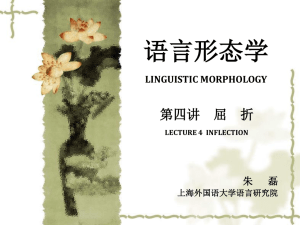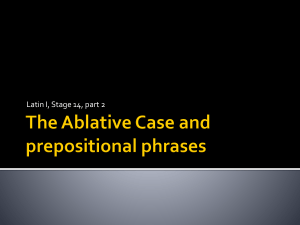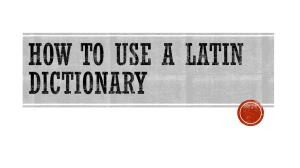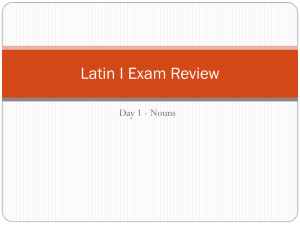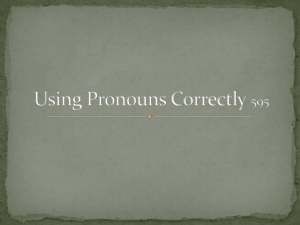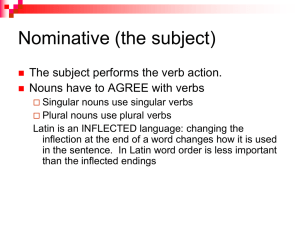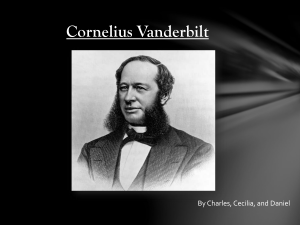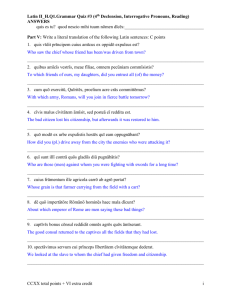Latin Textbook Excerpt: Roman Life & Grammar
advertisement
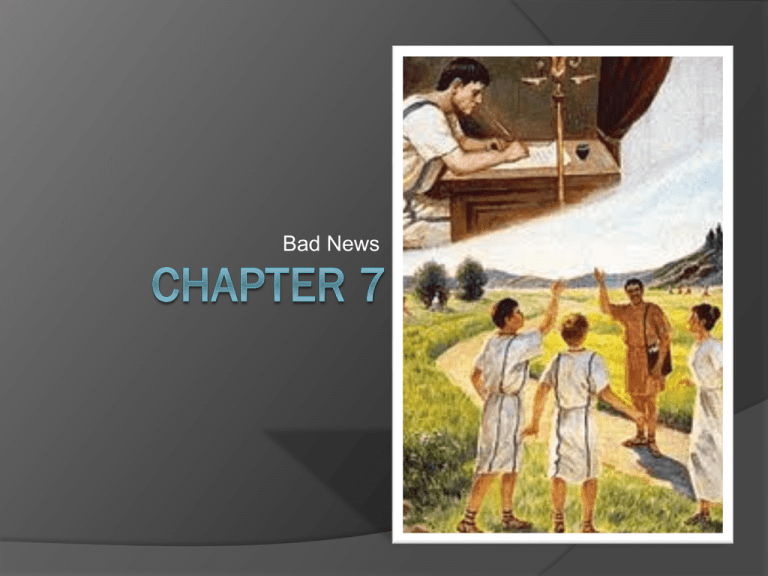
Bad News OCCUPATUS LABORANTES SPECTANT NUNTIUS VENIT SALUTAT SALVE! INQUIT MEUS DUCIT TRADIT EHEU! PRINCEPS AD URBEM REVOCAT CONSULERE REDIRE EUGEPAE! IRE Expanding Your English Vocabulary 1. The emperor has the power to call back a senator’s privileges. 2. Wearing the toga was a well established custom handed down among Roman citizens. 3. The messenger’s greeting to the boys was friendly. 4. The games in the arena attract many observers. 5. Cornelia enjoys her time in Baiae more than city life. 6. The visitor declared that he was a messenger from the emperor. 7. The emperor’s letter brought forth a groan of disappointment from Cornelia. 8. The messenger’s business is to deliver the emperor’s letters. 9. The emperor composes formal letters to instruct the senators. Word Bank: tradition (tradit)________ spectators (spectant) _________ revoke (revocat) __________ consultant (consulere) __________ produced (ducit) __________ salutation (salutat) ________ urban (urbem) _________ epistles (epistulas) _________ occupation (occupatus) _________ announced (nuntius) __________ Pre-Reading… In villa sedet vir Romanus, nomine Gaius Cornelius, qui est pater Marci et Corneliae. Cornelius est senator Romanus. Solus sedet quod multas epistulas scribere vult. Dum pater occupatus est, Marcus et Sextus et Cornelia in agris vicinis errant. Ibi multos servos laborantes FABULA spectant. Subito nuntium conspiciunt qui ad eos venit. Nuntius, ubi advenit, pueros salutat. “Salve!” respondet Marcus. “Quem tu petis?” Nuntius, “Gaium Cornelium peto,” inquit. Marcus, “Gaius Cornelius est pater meus,” inquit. “Est in villa.” Nuntium in villam ducit et patrem petit. FABULA “Pater,” inquit Marcus, “nuntius in villa est.” Cornelius statim venit et nuntium salutat. Epistulam nuntius tradit. Cornelius, ubi epistulam legit, “Eheu!” inquit. “Princeps senatores Romanos ad urbem revocat. Eos consulere vult. Necesse est ad urbem redire.” “Eugepae!” clamat Sextus, qui Romam ire vult. potest. FABULA Gemit Cornelia quod Flavia urbem venire non Reading Comprehension 1. Cur Cornelius solus sedet? 2. Ubi Marcus et Sextus et Cornelia errant? 3. Quos spectant in agris? Quos…? Whom…? (plural) 4. Quis advenit? 5. Quem nuntius petit? 6. Cur princeps senators Romanos ad urbem revocat? 7. Quis clamat “Eugepae!” Cur? 8. Cur gemit Cornelia? Translation Review 1. Quis multas epistulas scribere vult?________________ multas epistulas scribere vult. 2. Quis pueros salutat? ________________ pueros salutat. 3. Quis Gaium Cornelium petit? ________________ Gaium Cornelium petit. 4. Quis nuntium in villam ducit? ________________ nuntium in villam ducit. 5. Quis epistulam tradit? ________________ epistulam tradit. 6. Quis epistulam legit? ________________ epistulam legit. 7. Quis “Eheu!” inquit? ________________ senatores revocat. 8. Quis senatores revocat? ________________ senatores revocat. 9. Quis est laetus quod necesse est Romam ire? ________________ est laetus quod necesse est Romam ire. 10. Quis ad urbem ire non potest? ________________ ad urbem ire non potest. Forms: Nouns and Adjectives: The Endings –as, -os, and -es Examples: Multas epistulas scribit. He writes many letters. Multos servos spectant. They watch many slaves. Senatores Romanos revocat. He recalls the Roman senators. multas epistulas, multos servos, and senatores Romanos use the new endings singular accusative direct objects end in M plural accusative direct objects usually end in S Nouns: Cases and Declensions Subject of a verb or a complement with est or sunt is the NOMINATIVE CASE Direct Object of a verb is the ACCUSATIVE CASE Examples: NOMINATIVE Lupus eum terret. The wolf frightens him. ACCUSATIVE Puellae lupum vident. The girls see the wolf. Lupi pueros terrent. The wolves frighten the boys. Servi lupos repellunt. The slaves drive off the wolves. Puella est laeta. The girl is happy. Mater puellam laetam videt. The mother sees the happy girl. 1st Declension Number Case 2nd Declension 3rd Declension Singular Nominative Accusative puella puellam servus servum puer puerum ager agrum pater patrem vox vocem Plural Nominative Accusative puellae puellas servi servos pueri pueros agri agros patres patres voces voces Notes: Most 1st declension nouns are feminine Most 2nd declension nouns are masculine Some 3rd declension nouns are masculine and some are feminine Direct Object ID 1. Cornelius multas epistulas scribit. 2. Pueri magnam arborem in agris vident. 3. Nuntius qui ad pueros venit magnos clamores audit. 4. Magnas voces audit. 5. Nuntius pueros defessos salutat. 6. Princeps senatores Romanos ad urbem revocat. 7. Sextus ad magnam urbem ire vult. 8. Cornelia ad urbem redire non vult quod villam rusticam et amicam vicinam amat. Fill in the Blanks A Latin noun in the nominative case is used as the ______________________ of the verb. A Latin noun in the accusative case is used as the ______________________ ______________________ of the verb. The Latin nouns met so far fall into ______________________ declensions. Nouns in the ______________________ declension end in –a in the nominative singular; but a few nouns, like ______________________ and ______________________, end in –r. The nominative singular of the ______________________ declension varies from noun to noun. Some examples of 3rd declension nouns are: ______________________, ______________________, and ______________________. Endings Practice 1st Declension 2nd Declension 3rd Declension Singular Nominative Accusative VILL___ VILL___ LUP___ LUP___ PUER PUER___ AGER AGR___ VIR VIR___ ARBOR ARBOR___ URBS URB___ Plural Nominative Accusative VILL___ VILL___ LUP___ LUP___ PUER___ PUER___ AGR___ AGR___ VIR___ VIR___ ARBOR___ ARBOR___ URB___ URB___ Nom. 1. voc___ 2. serv___ Acc. Nom. voc___ 3. puer___ serv___ 4. agr___ Acc. puer___ agr___ Nom. 5. patr___ 6. puell___ Acc. patr___ puell___ Subjects and Direct Objects 1. Cornelius ___________________ scribit. (epistula: sing.) 2. Nuntius ___________________ salutat. (puer: pl.) 3. ___________________ Davum saepe vexant. (puer: pl.) 4. Davus multas ___________________ audit. (vox: pl.) 5. ___________________ rivum conspiciunt. (puella: pl.) 6. Cornelia ___________________ audit. (vox: sing.) 7. Multae ___________________ Corneliam terrent. (vox: pl.) 8. ___________________ Davus reprehendit. (servus: pl.) 9. Pueri ___________________ sollicitos in via vident. (pater: pl.) 10. Pueros sollicitos ___________________ in via vident. (pater: pl.) 11. Lupos ___________________ terret. (puella: pl.) 12. ___________________ puellam sollicitam vident. (servus: pl.) 13. Marcus ___________________ petit. (pater: sing.) 14. Servi ___________________ conspiciunt. (ager: sing.) 15. Davus ___________________ spectat. (ager: pl.) Rehash Direct Object ID 1. Cornelius multas epistulas scribit. 2. Pueri magnam arborem in agris vident. 3. Nuntius qui ad pueros venit magnos clamores audit. 4. Magnas voces audit. 5. Nuntius pueros defessos salutat. 6. Princeps senatores Romanos ad urbem revocat. 7. Sextus ad magnam urbem ire vult. 8. Cornelia ad urbem redire non vult quod villam rusticam et amicam vicinam amat. Building the Meaning: Reading with Attention to Cases How to read a Latin sentence: identify the case of each noun AS YOU MEET IT to decide what the function of the word will be in the sentence as a whole. As you meet each noun and decide its function, you will form expectations about what is likely to come later to complete the meaning of the sentence. Examples: 1. Servus currit. The first word we meet is servus. We know that it is the subject of the verb because we recognize that it is in the nominative case. The verb (currit) then tells us what the slave is “doing.” 2. Servus Davum conspicit. We go from servus (nominative=subject) to Davum and recognize that Davum is the direct object of the verb because we recognize it as accusative case. Davum also tells us that the verb in this sentence is transitive, because Davum is a direct object and direct objects appear only with transitive verbs. The verb tells us what the slave is “doing” to Davus. 3. Davum pueri vexant. The first word we meet is Davum. We recognize it as accusative case. The next word is pueri. We recognize that it is nominative, and therefore it is the boys who are doing something to Davus. The verb vexant tells us what they are doing. 4. Ramum arripit. We recognize Ramum as accusative case, and we know immediately that someone is doing something to a branch. Since there is no noun in the nominative case, the ending of the verb indicates the subject (he/she) and the meaning of the verb completes the sense. Attention to Case Practice 1. Lupus puellas terret. 2. Puellae silvam amant. 3. Davum et servos pueri vexare non timent. 4. Pueros et puellas lupi semper terrent. 5. Servi lupos ex agris repellunt. 6. Nuntium pueri et puella in agris vicinis conspiciunt. 7. Ubi pueros nuntius salutat, Cornelia ad villam currit. 8. Matrem Cornelia statim petit. 9. “Nuntium,” inquit Cornelia, “pueri in agris nunc salutant.” 10. “Necesse est,” respondet Aurelia, “cibum parare.” 11. Cibum ancillae parant. 12. Cornelius, ubi advenit nuntius, eum salutat. 13. Epistulam Cornelius legit. 14. Aurelia nuntium salutat et “Ecce! Cibum ancilla,” inquit, “portat.” 15. Statim advenit ancilla, et cibum portat. Building the Meaning: Nominative or Accusative Plural? How Do You Decide? In 3rd declension nouns, the ending of both the nominative and accusative plural is –es. When you meet a noun with this ending, you cannot tell from the word itself whether it will be a subject or direct object. TO do so in the sentences below, you must first identify the case of the other noun in each sentence. Note the kind of logic modeled below these sentences: 1. Pueri clamores audiunt. -Since pueri is in the nominative case and is therefore the subject of the verb, clamores must be in the accusative case and therefore the direct object. 2. Pueros clamores terrent. -Since pueros is accusative, clamores must be nominative. 3. Princeps senatores excipit. -Since princeps is nominative, we assume that senatores will be accusative. This is confirmed by the singular transitive verb excipit. 4. Principem senatores excipiunt. -Since principem is accusative, we assume that senatores will be nominative. This is confirmed by the fact that the verb excipiunt is plural. 5. Clamores matres audiunt. -Where both nouns end in –es and the verb is plural, it is the sense that indicates that clamores is accusative and matres nominative. 6. Magnos clamores patres audiunt. 7. Magni clamores patres terrent. -The endings on the adjectives tell that clamores is accusative in Sentence 6, and nominative in 7. Nominative or Accusative? 1. Flavia arbores conspicit. 2. Hodie Flavia arbores ascendere vult. 3. Quod arbores Sextum nunc terrent, puer molestus ad villam redit. 4. Brevi tempore matres puellas revocant. 5. Puellae voces non audiunt. 6. Aurelia, “Eheu!” inquit, “puellae arbores non ascendunt.” 7. Matres puellas ex arbore descendere iubent. Writing in Latin 1. Cornelius is writing letters in the country house. 2. The boys run into the woods, because they* want (volunt) to climb trees there. 3. Suddenly they* hear a voice. 4. A messenger comes toward them and says, “I am looking for Cornelius.” 5. “The emperor is recalling the senators.” 6. “It* is necessary to return to the city.” 7. Cornelius wants to write many letters. 8. Marcus and Sextus watch many slaves working in the fields. 9. The messenger greets the boys. 10. The messenger is looking for Gaius Cornelius. 11. The messenger hands over a letter. 12. It* is necessary to return to the city immediately. 13. Sextus wishes to go to Rome, but Flavia cannot. Culture: The Roman Villa Cities Majority lived in insulae (apartments) Cornelius lived in a domus (self contained house) Country Villa (country house) Country Houses Houses had three distinct areas First Area: accommodation for the owner and family when they came to the country (usually in the summer) ○ ○ ○ ○ ○ ○ ○ BA BA BA BA B DR T R BR B R garden Garden with a fishpond Dining room Bedrooms Bakery Tool room Baths kitchen Second Area Housed livestock Slave quarters for year round workers Third Area Room for pressing grapes Olive pressing rooms Farmyard with wine vats Barn for storage grain Area-open space for threshing grain livestock Pressing grapes Slaves quarters Wine vats Olive press B A R N Threshing floor Davus (vilicus-overseer) ran the villa rustica in Cornelius’ absence Some landowners had tenant farmers Columella, On Agriculture I.VII-VIII The owner should conduct himself civilly with his tenants, and speak affably, not haughtily, to them; he should be more concerned about their work than their payments of rent, because this offends them less and in the long run is more profitable. For the position of vilicus, a man should be chosen who has borne up under heavy work, one who has been tried by experience. He should be past young manhood and yet not be old, because older men think it beneath them to take orders from a young man, and an old man will break down under heavy labor. Let him be middle aged, strong, skilled in farming or at least able to learn. As for the other slaves, I myself talk rather familiarly with them for it lightens their toil, and I even make jokes with them and allow them to make jokes. I also now make it my practice to consult them on any new work, as if they were experienced, so that I can come to know their abilities. Moreover, they are more willing to undertake a task on which they think their opinions have been asked and on which I have followed their advice. Villa urbana “city villa” separate from the accommodations of the farm Could be very luxurious and take up nearly the entire estate Winter and summer apartments-oriented to the seasonal sunlight Pliny the Younger Villa urbana near Laurentum described in a letter to a friend Villa maritimae=houses by the sea (mare) Pliny the Younger’s Villa Urbana Decorating Romans loved natural beauty and artistic representations of it Walls in city and country houses would be painted Pliny the Elder (uncle of Pliny the Younger) ○ With pictures “of country houses and landscaped gardens, copses, woods, hills, fish ponds and canals, rivers, coasts, and any other scenery one could desire, and scenes of people strolling along or sailing in a boat, or traveling to the country in carriages, people fishing, fowling and hunting, or gathering grapes” Pliny the Younger’s villa urbana in Etruria “Opposite the dining room at the corner of the colonnade is a large bedroom. From some of its windows you look onto the terrace, from others onto the meadow, while the windows in front overlook an ornamental pool which is a pleasure both to see and hear. For the water, falling from a height, foams white in the marble basin. The bedroom is very warm in the winter, being so exposed to the sun, and on a cloudy day the hot air from the nearby furnace takes the place of the sun’s heat. From here you pass through a spacious and pleasant changing room into the “cold bath” room in which there is a large bath out of the full sunlight. But if you want more space to swim in and warmer water, there is a pool in the courtyard and near it a fountain in which you can cool yourself if you’ve had enough of the heat.” “I can relax there with fuller and more carefree enjoyment. I need never wear a toga; nobody calls from next door. All is calm and quiet, which makes the place healthy, as do the clear sky and pure air. There I enjoy health of body and mind, for I keep my mind in training by study and my body by hunting.” Model of a Roman House House of Pansa A. Ostium or fauces into the house B. Tuscan atrium C. Cubicula D. Alae E. Tablinum F. Fauces into garden G. Peristyle H. Servants' hall K. Triclinium L. Oecus M. Posticum ostium N. Culina P. Portico Q. Garden R. Reservoir which supplies water to S. S. Tank House of the Vetii House of the Tragic Poet 1. Ostium or fauces into the house 2. Atrium 3. Chambers for family and guests 4. Landing and stairs up 5. Alae 6. Tablinum 7. Fauces into garden 8. Peristyle 9. Triclinium 10. Kitchen 11. Cubicula House of Sallust 2nd century B.C. 79 A.D. Atrium Compluvium Impluvium Cubiculum First Style Second Style Third Style Fourth Style Reproductions of Lararia Lararium Showing Lares and Penates From the House of the Vetii Statue of a Lar From the House of Caecilius Peristyliulm/Hortus Triclinium Culina MythBuster: Aphrodite Roman Name: Venus Greek Name: Aphrodite (Ajrodith) Parents: Zeus and Dione (according to Homer) or born from Cronus’ severed sexual member (according to Hesiod) Dominion: Love and beauty Favorite Places: Cyprus, Corinth, Cythera Symbols: Rose, dove Archetype: Emotionally open, appreciative of beauty and luxury; can be vain “stirs up sweet desire in the gods and tames the tribes of mortal men and all the birds and beasts and creatures of the sea”Homeric Hymn to Aphrodite Epithets: radiant, gold wreathed Only three gods she cannot sway: Hestia, Athena, Artemis Name means “one born from foam” Played an important role in Trojan War Offered Paris the golden apple Intervened to save Paris and her son Aeneas Had numerous lovers: Ares, and others Children: several, best known=Cupid (Eros)
